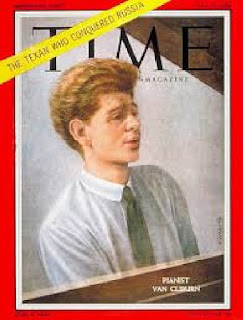 |
| Cliburn |
After a period of complete dissociation between the US and the USSR, as part of a movement toward a thaw in the Cold War, a group of 50 pianists from 19 countries, including a few from the United States, went to Moscow to participate in the International Tchaikovsky Piano Competition.
Harvey Lavan "Van" Cliburn Jr. (July 12, 1934 – February 27, 2013) had won an American competition at age 20, only to drift into an unremarkable career. But in Moscow when he played Tchaikovsky's first piano concerto and got a standing ovation lasting eight minutes the Soviet judges recognized his talent, but were unsure whether they could give the prize to an American.
As the story goes, the judges sought Soviet Premier Nikita Khrushchev's approval and when he asked if Cliburn was the best and after being assured that he was, Khrushchev replied, "Then give him the prize.”
Cliburn was given hero's welcome upon his arrival in New York with a ticker-tape parade and a declaration by the mayor. He continued to perform and record through the 1970s, but in 1978, after the deaths of his father and his manager, he began a hiatus from public life until 1987 when he performed at the White House for President Ronald Reagan and Soviet president Mikhail Gorbachev. From then on, he continued to perform until his death.
Cliburn’s ticker-tape parade aside, back in the U.S. most most people weren’t into such highbrow stuff. They were watching junk on TV, mostly Westerns. The top Westerns were Gunsmoke, Wagon Train, Have Gun – Will Travel, The Rifleman, Maverick, Tales of Wells Fargo and The Life and Legend of Wyatt Earp ...that’s 7 out of the top 10 TV programs! The other three were The Real McCoys, I've Got a Secret and The Danny Thomas Show. Seven more Westerns were included in the top 30 programs.
In 1958 a handful of USCF members knew that on January 8, Bobby Fischer, at age 14 years and 9 months won the 1957/58 U.S. Championship and Zonal with 8 wins, 5 draws and no losses. Reshevsky finished second. When Fischer appeared on the popular I've Got a Secret he received a little wider recognition, but was quickly forgotten about by the general public.
Another promising player was Raymond Weinstein who won the US Junior championship in Homestead, Florida. He went on to infamy.
Also in 1958, in a chess world with only a handful of GMs, the unheralded Canadian IM Frank Anderson (1928-1980) scored 84 percent before his final round game in the Olympiad in Munich, West Germany. Anderson was unable to play the final round game due to illness and so missed the GM title. The tragedy was that even if he had played and lost he would have played the requisite number of games and gotten the title.
Also taking place in 1958 was the Interzonal at Portoroz. It was a 21-player event with the top six players qualifying for the 1959 Bled-Zagreb-Belgrade Candidates tournament, with the proviso that no more than four players from any one country could advance. Tal, Gligoric, Benko, Petrosian, Fischer and Olafsson qualified. Smyslov and Keres were seeded in.
Amid all that, in Moscow the Championship of The Central Chess Club was held. In the past the club has, and still does, serve not only as a base of operations for many great players but a repository filled with trophies, paintings, antique sets, and other memorabilia depicting both past and present eras of chess. Even Bobby Fischer visited the club in 1958 when he was a 15-year-old prodigy and there’s a picture of him hanging in the club.
In 1958, Moscow’s Central Chess Club Championship has a hard fought affair in which Yuri Vasilichuk (born in the Ukraine on February 06, 1929, died 2012 at the age of 83) won in spite of losing two games, including his game against the runner up.
Vasilchuk played successfully in three Soviet Junior Championships: 1945 (tied for places 1-3 with Tigran Petrosian and A.Reshko), 1946 (2nd place behind Petrosian) and 1947 (6th place).
In those days the Soviets had a gaggle of players that were extremely strong, but with so many players in the master pool, they went almost unnoticed. The fact that the strong IM Alexander Konstaninolpolsky finished so poorly in the club championship is indicative of how tough life as a chess master was.
Final Standings:
One of the more interesting games from the championship was the following one between a couple of unknowns. Nikolay Golovko was born May 4, 1917 and died at the age of 70 on January 5, 1988. Beyond that I could find nothing on him or his opponent.



No comments:
Post a Comment